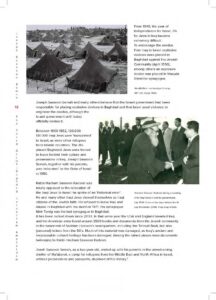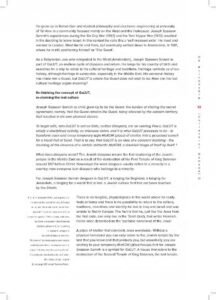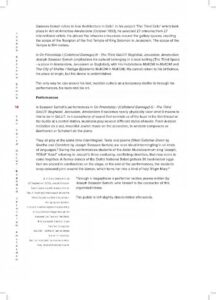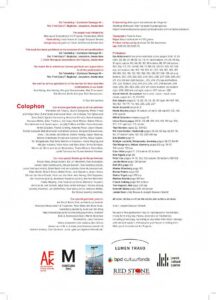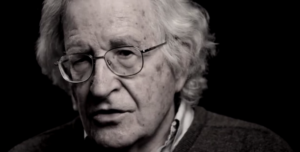Linda Bouws ~ Joseph Sassoon Semah: Re-Thinking The Concept Of GaLUT, Re-Claiming The Lost Culture
Click to enlarge
From: Linda Bouws & Joseph Sassoon Semah (Eds.) – Joseph Sassoon Semah – On Friendship/(Collateral Damage) III – The Third GaLUT: Baghdad, Jerusalem, Amsterdam, 2020. ISBN 978 90 361 0601 6.
To order the book, please send e-mail to Stichting Metropool Internationale Kunstprojecten, € 39,95 excl. shipping costs, rek.nr. NL 42 INGB 0006 9281 68 o.v.v. On Friendship III, please add name & address. Contact: https://www.metropool-projects.com/contact
Photo’s: Ilya Rabinovich
Killing Nature Must Be Treated As A Crime On A Par With Genocide And War Crimes
The time has come for drastic measures to protect the environment and save the world from a climate catastrophe.
The first United Nations Scientific Conference on the Environment, also known as the First Earth Summit, was held in Stockholm, Sweden, from June 6-15, 1972. Ιt established a Declaration of Principles and adopted an action plan with recommendations for the preservation and enhancement of the environment. Furthermore, and perhaps more importantly, it led to the creation of the United Nations Environment Programme (UNEP).
Since then, environmental issues and climate evolution have figured prominently on the global agenda, yet pledges made to protect the environment and reduce emissions are not being fulfilled. Without an international enforcement mechanism, governments are not legally bound to make good on their commitments, for example, to slash greenhouse gas emissions in half by 2040, which is what Biden pledged that the US will do.
Equally significant, environmental legislation aimed at imposing criminal penalties on corporations and their officials remains weak and, in some countries, even non-existent. In the US, where several types of criminal violations are specified in the Clean Air Act and whose definition of an air pollutant includes greenhouse gas emissions, following a 2007 US Supreme Court ruling on the matter, many states regularly look the other way when it comes to protecting public health and the environment from illegal air pollution from oil refineries and chemical plants. Texas, for example, failed between 2011 and 2016 to penalize 97 percent of illegal polluters.
Of course, let’s not forget the US military’s carbon footprint, which spews so much greenhouse gas emissions from fuel usage alone that if it were a country it would rank as the 47th worst polluter in the world, according to a 2019 report released by social scientists at Durham University and Lancaster University in UK.
In the meantime, China has emerged as the world’s biggest greenhouse gas emitter, with 60 percent of its power provided by coal, although it is still far behind the US in terms of per capita emissions.
Thus, nearly half a century after the First Earth Summit, most environmental problems have worsened, and nature and climate are subsequently on the verge of breakdown. The rate of species extinction is accelerating, according to scores of scientific studies, and there continues to be a relentless rise in carbon dioxide in the atmosphere caused by the burning of fossil fuels like coal and oil which causes temperatures to rise, producing the phenomenon of global warming.
Essentially, what we have is a cause-and-effect relationship between anthropogenic climate change and species extinction. Higher temperatures lead to a chain reaction of other changes around the globe, with tremendous impact not simply on people but also on wildlife and biodiversity. Today’s extinctions proceed at a pace faster than ever before, with around one million species already facing extinction, “many within decades,’ according to a major United Nations 2019 report.
The time has come for drastic measures to protect the environment and save the world from a climate catastrophe. Polluting the environment is a crime, but environmental criminals are almost never prosecuted. Environmental crime is still regarded a “white collar crime,” subject mostly to civil charges and accompanied by fines, when the reality on the state of the planet mandates that environmental destruction be conceptualized as a crime against humanity.
Fines are surely not enough to deter greedy and ruthless capitalists from destroying the environment, even if fines happen to be as steep as those involved in the historic greenhouse gas enforcement case between the US Environmental Protection Agency (EPA) and Hyundai and Kia that forced the automakers to pay $100 million civil penalty for, among other wrongdoings, emitting more greenhouse gases than reported to EPA or, even more recently, of the seemingly humongous fine of $1 billion levied against German automakers Volkswagen and BMW by the European Union. Both automakers were fined for colluding to curb the use of emissions cleaning technology.
Chomsky: Outdated US Cold War Policy Worsens Ongoing Russia-Ukraine Conflict
The tension on the Russia-Ukraine border represents an ongoing conflict between two nations with many cultural affinities, but is also part of a much larger rivalry between the U.S. and Europe on one side, and Russia on the other. As Noam Chomsky reminds us in the exclusive interview for Truthout that follows, in 2014, a Russia-supported government in Ukraine was forcefully removed from power by a coup supported by the U.S. and replaced by a U.S. and European-backed government. It was a development that brought closer to war the two main antagonists of the Cold War era, as Moscow regards both U.S. and European involvement in Ukraine and the North Atlantic Treaty Organization’s (NATO) continued eastward expansion as part of a well-orchestrated strategy to encircle Russia. The strategy of encirclement is indeed as old as NATO itself, and this is the reason why Russian President Vladimir Putin issued recently a list of demands to the U.S. and NATO with regard to their actions in Ukraine and even parts of the former Soviet space. In the meantime, senior-level Russian officials have gone even further by warning of military response if NATO continues to ignore Moscow’s security concerns.
As Chomsky notes below, the Russia-Ukraine conflict is a solvable problem, but one wonders if the U.S. will remain dedicated to a “zombie policy” that could produce potentially awful consequences in the event of a diplomatic failure.
Noam Chomsky is internationally recognized as one of the most important intellectuals alive. His intellectual stature has been compared to that of Galileo, Newton and Descartes as his work has had tremendous influence on a variety of areas of scholarly and scientific inquiry, including linguistics, logic and mathematics, computer science, psychology, media studies, philosophy, politics and international affairs. He is the author of some 150 books and recipient of scores of highly prestigious awards, including the Sydney Peace Prize and the Kyoto Prize (Japan’s equivalent of the Nobel Prize), and of dozens of honorary doctorate degrees from the world’s most renowned universities. Chomsky is Institute Professor Emeritus at MIT and currently Laureate Professor at the University of Arizona.
C.J. Polychroniou: Following the undoing of the USSR between 1980-1991, people in Ukraine voted overwhelmingly in 1991 to declare independence from the crumbling communist empire. Since then, Ukraine has sought to align closely with the European Union (EU) and NATO, but Moscow has objected to such plans, as it has always considered Ukraine to be part of Russia, and, accordingly, continued to meddle in the country’s internal affairs. In fact, Ukraine became a battleground in 2014 when Putin decided to annex Crimea, which he called the “spiritual source” of the Russian state, and, since then, tensions between the two countries have been very hard to diffuse. In your own view, what’s really behind the conflict between Russia and Ukraine?
Noam Chomsky: There’s more to add, of course. What happened in 2014, whatever one thinks of it, amounted to a coup with U.S. support that replaced the Russia-oriented government by a Western-oriented one. That led Russia to annex Crimea, mainly to protect its sole warm water port and naval base, and apparently with the agreement of a considerable majority of the Crimean population. There’s extensive scholarship on the complexities, particularly Richard Sakwa’s Frontline Ukraine and more recent work.
There’s an excellent discussion of the current situation in a recent article in The Nation by Anatol Lieven. Lieven argues realistically that Ukraine is “the most dangerous [immediate] problem in the world,” and “also in principle the most easily solved.” The solution has already been proposed and accepted — in principle: the Minsk II agreement, adopted by France, Germany, Russia and Ukraine in 2015, and endorsed unanimously by the UN Security Council. The agreement tacitly presupposes withdrawal of George W. Bush’s invitation to Ukraine to join NATO, reaffirmed by Barack Obama, vetoed by France and Germany, an outcome that no Russian leader is likely to accept. It calls for disarmament of the separatist Russia-oriented region (Donbas) and withdrawal of Russian forces (“volunteers”), and spells out the key elements of settlement, with “three essential and mutually dependent parts: demilitarization; a restoration of Ukrainian sovereignty, including control of the border with Russia; and full autonomy for the Donbas in the context of the decentralization of power in Ukraine as a whole.” Such an outcome, Lieven observes, would not be unlike other federations, including the U.S.
Minsk II has not been implemented because of disagreements about timing of its various measures. The issue has been “buried” in U.S. political circles and media, Lieven writes, “because of the refusal of Ukrainian governments to implement the solution and the refusal of the United States to put pressure on them to do so.” The U.S., he concludes, has been keeping to “a zombie policy — a dead strategy that is wandering around pretending to be alive and getting in everyone’s way, because U.S. policy-makers have not been able to bring themselves to bury it.”
The imminent dangers make it imperative to bury the policy and adopt a sound one.
Noam Chomsky: US-China Cooperation Is Essential To Avert A New Cold War
We live at a critical juncture in world history. In spite of immense progress in some areas of human civilization, the prospects of annihilation caused by interstate conflict among competing powers with unimaginably destructive weapons continue to haunt human relations in the early part of the 21st century even when challenges such as climatic catastrophes may end up being disastrous for all forms of life on planet Earth. A few decades ago, it was the U.S.-USSR conflict that threatened to blow up the planet, thanks to the imperial ambitions of a newly emerged empire in world history to remake the world in its own image. Today, it is the U.S.-China conflict that threatens us with a futuristic scenario of global annihilation as the Western empire in decline continues to insist upon dictating the direction of world affairs according to its own image and interests.
In the interview below, one of our most esteemed public intellectuals of the last half century, whose intellectual stature has been compared to that of Galileo, Newton and Descartes, offers us his own views and assessment of the increasingly dangerous tension between the United States and China. Noam Chomsky is Institute Professor Emeritus at MIT and currently Laureate Professor at the University of Arizona. The recipient of scores of highly prestigious awards, including the Sydney Peace Prize and the Kyoto Prize (Japan’s equivalent of the Nobel Prize), of dozens of honorary doctorate degrees from the world’s most renowned universities, and author of some 150 books on linguistics, politics, international affairs, history and media studies, Chomsky has had tremendous influence on a variety of areas of scholarly and scientific inquiry, including linguistics, logic and mathematics, computer science, psychology, media studies, philosophy, politics and international affairs.
C.J. Polychroniou: Noam, the U.S.-China relationship has gone through ups and downs over the course of the last 30 or so years. Clearly, the sort of relationship that exists today between the two countries is far more antagonistic than it was even 10 years ago. In your own view, what forces or processes are responsible for the increasing tensions we are witnessing today in U.S.-China relations?
Noam Chomsky: After the fall of the USSR, there was much euphoria about the end of history with “liberal democracy” (a code word for the U.S.) having achieved total victory. A corollary was that China could now be brought within the “rule-based international order.”
The latter is a now-conventional phrase, one worth pondering. It refers to an international order in which the U.S. sets the rules, displacing the international order established by the United Nations, which the U.S. deems antiquated and irrelevant. The UN Charter is the Supreme Law of the Land under the U.S. Constitution, constantly violated, a matter of no concern to those who pledge reverence for the Holy Text. Its provisions have been considered inappropriate for the modern world ever since the U.S. lost control of the UN with decolonization, and occasional backsliding among the privileged as well. UN members no longer know “how to play,” to borrow Thomas Friedman’s ridicule of France when it failed to support the benign U.S. invasion of Iraq, accompanied by his call for the miscreant to be deprived of its permanent membership in the Security Council. The self-described “world’s greatest deliberative body” contented itself with renaming French fries as “Freedom fries” in the Senate cafeteria.
Right-thinking people understand that the outdated UN-based international order is to be replaced by the rule-based order, including such constructions as the highly protectionist “free-trade agreements,” right now yielding such pleasures as barring a “people’s vaccine” that would alleviate the COVID disaster. The Clintonites were particularly enthusiastic about incorporating a well-disciplined China within this forward-looking rule-based order.
It didn’t work as planned. China refuses to play when it doesn’t want to. Worse still, it can’t be intimidated. It goes its own way. That way is often ugly, but that’s of no relevance to the rule-based order, which easily tolerates vicious crimes by the righteous — notably the Master — with equanimity and often approval.
China is not Europe. The countries of Europe may fume when the U.S. decides to destroy the joint agreement with Iran (the JCPOA) and to impose harsh sanctions to punish Iran for Washington’s demolition of the agreement. They may even proclaim that they will develop ways to avoid the murderous U.S. sanctions. But in the end, they go along, not willing to incur the wrath of the Godfather, or his punitive measures, such as expulsion from the international financial system, controlled by Washington. Same in many other cases.
China is different. It insists on the UN-based system (which it violates when it chooses to). As former Australian Prime Minister Paul Keating explained, the much-heralded “China threat” reduces to the fact that China exists and is successfully defying the rules.
Biden’s “Democracy Summit” Prioritized US Hegemony Over Democratic Ideals
For stark evidence that we live in a world where political hypocrisy reigns supreme, one need look no further than Biden’s recent Democracy Summit.
The United States — which was rated for the fifth consecutive year as a “flawed democracy” by a “leader in business intelligence” — sought to project itself at last week’s summit as a leader in the fight to preserve global democracy, despite its long and dark history of overthrowing democratically elected governments and installing military dictatorships, and in spite of its ongoing support for any regime, however autocratic, that supports the interests and the objectives of the U.S. empire.
As if this wasn’t hypocritical or farcical enough, many of the countries invited to take part in the summit are governed by leaders with little concern for democratic norms, such as India’s Narendra Modi, Brazil’s Jair Bolsonaro and Rodrigo Duterte of the Philippines. These are authoritarian-led nations, but they enjoy robust economic and political relations with the United States.
China and Russia were not invited. Neither was Turkey because of Recep Tayyip Erdoğan’s extensive military deals with Russia.
The summit brought together leaders from government and the private sector, all of whom seem to have accepted the fact that democracy is under strain in today’s world, but there was no acknowledgement of the factors responsible for the weakening of democratic governance and the resurgence of authoritarianism. What one heard were pledges to strengthen democratic accountability, expand economic opportunities and protect human rights. In other words, the same blah, blah, blah, delivered by leaders at COP26.
In sum, the Summit for Democracy was not about defending democracy; rather, it was a geopolitical gambit to advance U.S. foreign policy objectives. As such, the question as to why democracy is undergoing an alarming decline across the world was simply left hanging in the air.
What really accounts for the spread of authoritarianism over the last few decades? And how does it differ from the forms of political authoritarianism that were prevalent during the Cold War era?
Today’s authoritarianism (often called “authoritarian populism”) is a complex phenomenon, with unique economic, cultural, political and social dimensions. Thus, while the ideological location of “authoritarian populism” is to be found on the far right of the political spectrum, there are important differences with regard to policymaking between regimes such as Victor Orbán’s in Hungary and Donald Trump’s during his four-year reign.
Different political contexts also play a key role in the resurgence of authoritarianism. Thus, while the rise of the new radical right in Europe is directly linked to the decline of the left on the continent, in Latin America, by contrast, the radical right has grown in a period of sharp electoral gains by the left.
Nonetheless, what bonds authoritarian leaders in today’s world is their affinity for forms of political behavior that result in repressive measures, undermine all forms of collective decision-making — and indeed of the democratic process itself — and lead to the formation of autocratic regimes. In addition, all of the above leaders employ a rhetoric that can be loosely defined as xenophobic, if not outright racist, while seeking at the same time to gain popular support by using an ideology of extreme nationalism and emphasizing “law and order” as the basis for their political legitimacy.
Yet, we also need to understand how today’s authoritarian regimes are different from those in the past. They are run by leaders who enjoy considerable support among the citizens of their respective countries. The new generation of authoritarian leaders rose to power not through coups d’état but by elections and with vows to transform the existing socio-political order. They offered quick and easy solutions to social and economic problems, and managed to build a strong level of support among working class and nonurban populations, while at the same time enhancing the links of the state with the dominant capitalist classes in the domestic economy.
Take, for instance, the case of Orbán in Hungary, who was not invited to Biden’s Democracy Summit, as his policies make him a pariah within the European Union. Read more
With The Failure of Politics, People Are Waking Up To The Realization That They Have A World To Win
People everywhere are waking up to the realization that they must fight to organize the world in such a way that there is a sustainable future for humanity and the planet.
Last month’s COP26 climate summit at Glasgow ended as a complete flop. While some have hailed as success the mere inclusion of the phrase “unabated coal should be phased down” in the final agreement, the fact of the matter is that the transition from fossil fuels to clean energy remains a distant dream. It should also be obvious to all that the climate deal reached at COP26 in no way prevents planetary temperature from crossing the 1.5 degrees Celsius threshold.
But let’s be blunt about rising global temperatures. Thanks to the failure of politics with regard to global warming, the critical threshold of 1.5 degrees Celsius will be reached or exceeded within the next couple of decades under all emissions scenarios considered, according to IPCCS’ latest findings. The only question is whether we can prevent the planet from getting even hotter—potentially passing 2 degrees or even 3 degrees Celsius.
Indeed, our national leaders have failed us on climate change, and we know the reasons why.
I explained this in a recent Op-Ed for Al Jazeera English.
“First, leaders sit on climate negotiating tables with the intent to advance an agenda that serves above all their own national interests rather than the health of our planet. Their mindset is still guided by the principles of “political realism” and political short-termism. This is why their words are not matching up with their actions.
Thus, Joe Biden can make a moral pronouncement to world leaders at COP26 in Glasgow that the US will lead the fight against the climate crisis “by example”, but, less than two weeks later, his administration auctions oil and gas leases in the Gulf of Mexico.
Second, the nation-state remains the primary actor in world affairs, so there are no international enforcement mechanisms with regard to pledges about cutting emissions. International cooperation, let alone solidarity, is extremely difficult to attain under the existing political order, and as leading international affairs scholar Richard Falk has argued, “Only a transnational ethos of human solidarity based on the genuine search for win/win solutions at home and transnationally can respond effectively to the magnitude and diversity of growing climate change challenges.”
hird, “the logic of capitalism” guides the world economy. With profit-maximization as the ultimate motive, capitalism is toxic for the environment, especially in its neoliberal version, with a strong emphasis on deregulation and privatization. Under such a socioeconomic system, it is highly unlikely that the political establishment will dare to embark on a climate action course that might prove detrimental to powerful economic interests.”
But all is not yet lost. Climate activism is now a global movement, and it is surely our only way out of the climate conundrum.
An estimated 100,000 people marched in Glasgow, and tens of thousands in other cities around the world, demanding bold action at the COP26 climate conference. Global warming demonstrations are filled with people of all ages and walks of life. Scores of scientists were arrested during the COP26 summit for carrying out various acts of civil disobedience.
To be sure, real leadership at the Glasgow summit was on display by the thousands of activists who took to the streets—not by the diplomats inside the halls of the Scottish Event Campus.
Moreover, we should not overlook the fact that some progress has indeed been made in the fight against global warming. The European Union is trying to make more than 100 cities carbon neutral by 2030. In Latin America and the Caribbean, in Asia and the Pacific, hundreds of climate projects have been introduced to combat fight the climate crisis.
Progressive economists, like those at the Political Economy Research Institute (PERI) of the University of Massachusetts–Amherst, are taking real steps to help us combat global warming by producing highly detailed climate stabilization programs that drive sustainability while boosting employment. Indeed, Robert Pollin and some of his co-workers at PERI have brought the Green New Deal project to the forefront of public consciousness in scores of U.S. states. They are also hard at work now to spread it to other countries of the world.
Within the same context, organizations such as ReImagine Appalachia in the Ohio River Valley are laying the groundwork for a post-fossil fuel economy. Through both grassroots and grasstops initiatives, ReImagine Appalachia has engaged a wide variety of stakeholders in a shared vision of building a sustainable future based on clean and renewable energy sources and investments in the natural infrastructure to support “carbon farming,” but also through the creation of good union jobs for low-wage workers and by ensuring a just transition for all towards an environmentally sustainable economy, including of course workers in the extractive industries. As Amanda Woodrum, Senior Researcher, Policy Matters Ohio, and Co-Director, Project to ReImagine Appalachia likes to say, this is the only way that “Appalachia stays on the climate table, otherwise it will be on the menu.”
In the state with the largest economy in the United States, a detailed project of building a clean-energy infrastructure and reducing emissions by 50 percent as of 2030 and achieving a zero-emissions economy by 2045 has received strong support by more than 20 major unions across the state, including the United Steel Workers Locals 5, 675 and 1945 (who represent workers in the fossil fuel supply chain). The latest union to endorse the California Climate Jobs Plan, outlined in Program for Economic Recovery and Clean Energy Transition in California by Robert Pollin and his co-workers at PERI, is the San Fransisco Region of the Inland Boatman’s Union.
Indeed, labor activism in California is in the midst of a dramatic resurgence, with key labor union leaders and organizers such as, among others, Tracey Brieger, Dave Campbell, Norman Rogers, and Veronica Wilson, keen to continue the legacy of Tony Mazzocchi of the Chemical and Atomic Workers International Union. Mazzocchi was one of the earliest environmental activist leaders who advocated the idea of just transition for workers in carbon-intensive industries. His view, which is at the core of “Just Transition,” was that helping displaced workers should not be seen as philanthropy or welfare. According to Mazzocchi, those who had worked to “provide the world with the energy and the materials it needs deserve a helping hand to make a new start in life.”
There is no shortage of activism in today’s world. The Green New Deal Network, a coalition of 15 progressive organizations working together with the explicit aim of mobilizing grassroot power in order to advance the vision of the Green New Deal across key states, while also applying pressure at the federal level, is yet another case emblematic of the important shift taking place in a world where the conditions for the transition to a sustainable and just future are being so blatantly ignored by the political establishment.
People everywhere are waking up to the realization that they must fight to organize the world in such a way that there is a sustainable future for humanity and the planet. They know that they have a world to win.
Our work is licensed under Creative Commons (CC BY-NC-ND 3.0). Feel free to republish and share widely.
Source: https://www.commondreams.org/failure-politics-people-are-waking-realization-they-have-world-win
C.J. Polychroniou is a political economist/political scientist who has taught and worked in numerous universities and research centers in Europe and the United States. His latest books are The Precipice: Neoliberalism, the Pandemic and the Urgent Need for Social Change (A collection of interviews with Noam Chomsky; Haymarket Books, 2021), and Economics and the Left: Interviews with Progressive Economists (Verso, 2021).


